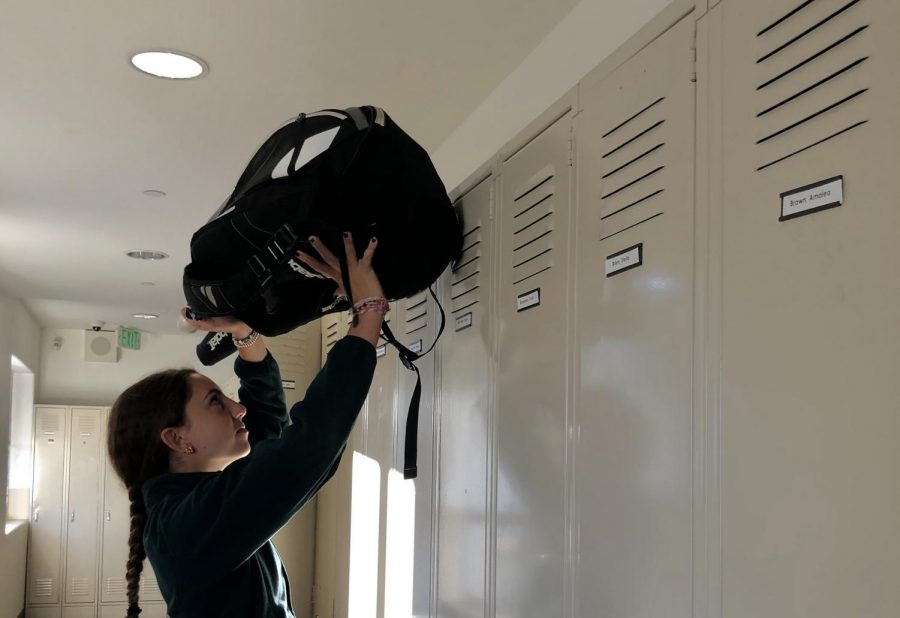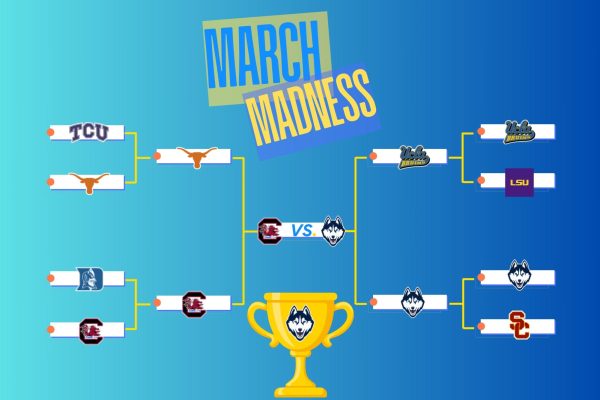‘You make sacrifices’: Athletes practice time-management, prioritization
Photo credit: Chloe Fidler
Sophomore varsity tennis player Naya Ben-Meir puts her tennis bag above the lockers at the start of school day. Ben-Meir has been on the varsity tennis team since her freshman year.
Sophomore Naya Ben-Meir participates in classes, scrimmages on the tennis court and rides the bus from 6:00 a.m. to 6:30 p.m. She describes her day as “active” as she manages everything from tests and papers to extracurriculars.
Ben Meir is far from alone. 50% of Archer students are athletes who must balance their full academic schedules with after-school practice and weekend games. But senior Sophie Larbalestier, a captain of the cross country and varsity soccer team, said her busy schedule has made her realize how “meaningful” her time is.
“It can be a little bit stressful when it comes to getting my work done,” Larbalestier said. “I’m not going to go home and watch three hours of Netflix.”
All athletes interviewed acknowledged their gratitude for their athletic opportunities.
“You just gotta make sacrifices,” Larbalestier said. “I would never give up sports, ever. I love them so much. [They are] one of my favorite things I do here.”
To find a balance, Archer athletes seem to get a “rhythm” or “routine” down to help solidify their time management skills, Larbalestier said. For example, Ben-Meir showers to relax and does work “as fast as possible.”
“You have to find your own system and see what works for you and experiment with different things,” Ben-Meir said. “I kind of prioritize what’s actually important and what I need to do that day or that night.”
Through playing a sport, athletes come to “understand” themselves as learners and how to adapt to commitments other than academics, according to Ben-Meir. Although Ben-Meir and Larbalestier both said they experience stress, coaches understand the obstacles that come with playing a sport.
“I think that, especially within the coaching staff, we’ve all been athletes,” Assistant Athletics Director Amelia Mathis said. “So we understand the sacrifice.”
With this prior experience, the coaches can relate to the athletes’ struggles regarding sports and balancing their schedules. Smith cited scientific research to help explain the athletes’ efficiency during their seasons.
“Athletes actually do better [academically] when they’re in season,” Athletics Director Kim Smith said. “Building off of that, we have a support network when they need it.”
Archer athletes said they have to give up free time and certain activities in order to prioritize sports. Mathis highlighted that athletes are students first. However, Mathis also noted that playing a sport is “rewarding” enough to make balancing it all worth it.
“Being an athlete is a privilege,” Mathis said. “You give up certain things and you make sacrifices.”

Chloe Fidler joined the Oracle as a staff reporter in 2019, became the Voices Editor in 2020 and continued that role through her senior year. Passionate...









Jessica Tuchin • Nov 14, 2019 at 8:07 pm
Great article Chloe!